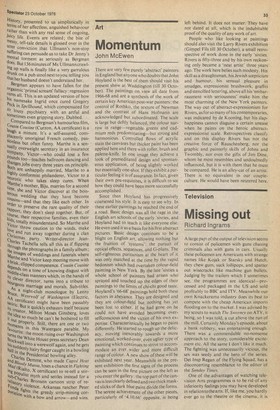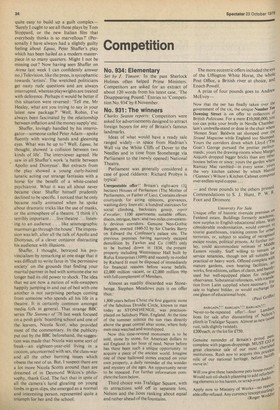Television
Missing out
Richard Ingrams
A large part of the output of television seems to consist of policemen with guns chasing criminals also with guns in cars. Usuall) these policemen are Americans with strange names like Kojak or Starsky and Hutch. they chew gum, suck lollipops, and spatter out wisecracks like machine gun bullets. Judging by the trailers which I sometimes see, the programmes are identical—processed and packaged in the US and sold profitably to BBC and ITV. Meanwhile our own Knackeratria industry does its best to compete with the cheap American imports flooding on to the market. I was advised by my scouts to watch The Sweeney on ATV, it being, so I was told, a cut above the run of the mill. Certainly Monday's episode, about a bank robbery, was entertaining enough. There was a commendable no-nonsense approach to the story, considerable excitement etc. All the same I don't like it much. The fighting was unnecessarily vicious, the sex was seedy and the hero of the series. Det I nsp Regan of the Flying Squad, has a disconcerting resemblance to the editor of the Sunday Times.
One of the advantages of watching television Arts programmes is to be rid of any inferiority feelings you may have developed in relation to the arts. If, like me, you hardly ever go to the theatre or the cinema, it is
quite easy to build up a guilt complex— 'Surely I ought to see all those plays by Tom Stoppard, or the new Italian film that everybody thinks is so marvellous?' (Personally I have always had a slightly guilty feeling about Equus, Peter Shaffer's play which has been hailed as a modern masterpiece in so many quarters. Might I not be missing out ? Now having seen Shaffer on Arena last week I can confidently answer no.) Television, like the press, is sycophantic towards 'artists'. The wretched politicians get nasty rude questions and are always interrupted, whereas playwrights are treated with deference. Perhaps it would be better if this situation were reversed: 'Tell me, Mr Healey, what are you trying to say in your latest new package ?"Well, Robin, I've always been fascinated by the relationship between inflation and the money supply' etc.
Shaffer, lovingly handled by his interrogator—someone called Peter Adam—spoke fluently with waving hands and gleaming eyes. What was he up to? Well, Equus, he thought, showed 'a collision between two kinds of life'. The interviewer agreed. He saw in all Shaffer's work 'a battle between Apollo and Dionysus'. But extracts from the play showed a, young curly-haired lunatic acting out strange fantasies with a horse for the benefit of a white-coated psychiatrist. What it was all about never became clear. Shaffer himself prudently declined to be specific. I noticed that he only became really animated when he spoke about dramatic tricks like the use of masks, or the atmosphere of a theatre. 'I think it's terribly important ... live theatre ... listening to an audience . . . like seismographic murmurs go through the house'. The impression was left, after all the talk of Apollo and Dionysus, of a clever conjuror distracting his audience with illusions.
Shaffer, I thought, betrayed his provincialism by remarking at one stage that it was difficult to write farce in 'the permissive society' on the grounds that finding your marital partner in bed with someone else no longer had its old power to shock. The idea that we are now a nation of wife-swappers happily jumping in and out of bed with one another is not surprising perhaps coming from someone who spends all his life in a theatre. It is certainly common amongst media folk in general. That strange BBC series The Sunmur of '76 last week focused on a posh girls' boarding school and one of the leavers, Nicola Scott, who provided most of the commentary. In the publicity put out by the BBC beforehand, the suggestion was made that Nicola was some sort of freak—an eighteen-year-old living in a cocoon, unconcerned with sex, the class-war and all the other burning issues which obsess the rest of us. But, I suspect there are a lot more Nicola Scotts around than are dreamed of in Desmond Wilcox's philosophy, thank God. The fact that in spite of all the camera's lurid gloating on young limbs in gym slips, she emerged as a normal and interesting person, represented quite a triumph for her and the school.











































 Previous page
Previous page